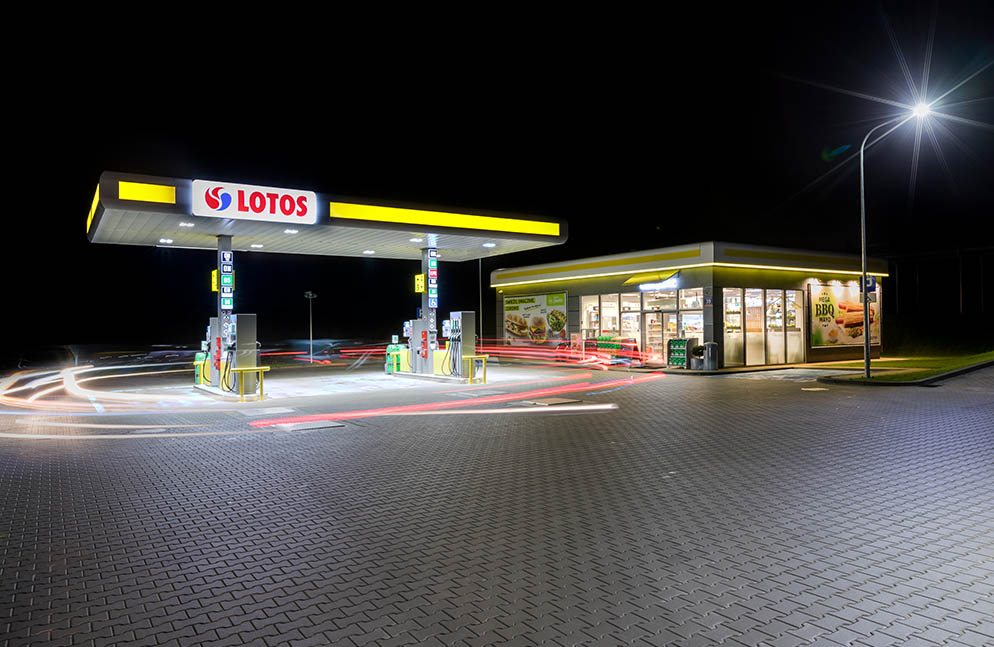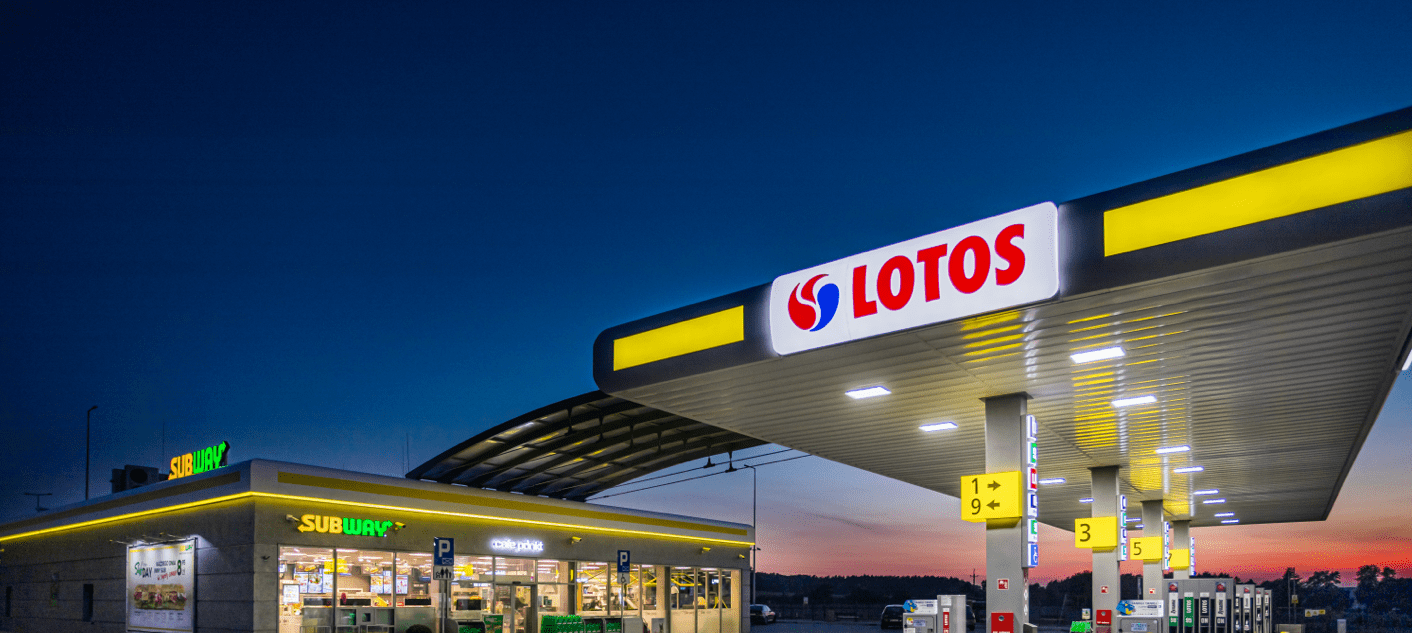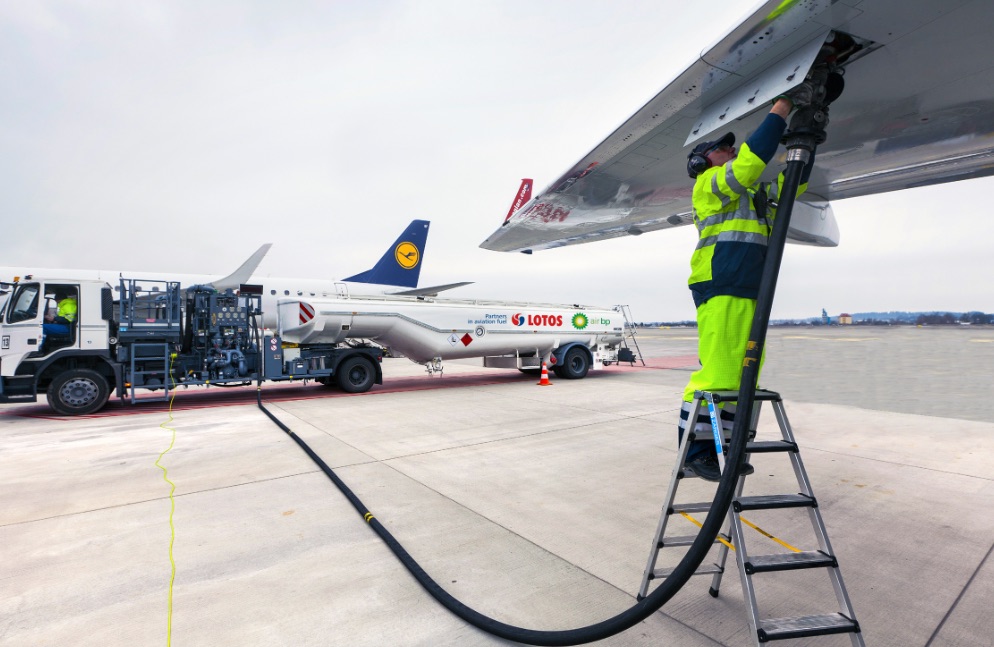The LOTOS Group company responsible for marketing aviation fuel on the home market is LOTOS – Air BP Polska. In 2020, LOTOS – Air BP Polska recorded a considerable decline in into-plane sale volumes, driven by a sharp year-on-year reduction in demand and a lower volume of aviation fuel produced by the LOTOS Group. As part of optimisation efforts, the LOTOS refinery in Gdańsk produced more diesel oil, which was sold on the home and international markets.
Sales of petroleum products on the domestic market

2020 was a difficult year, fraught with challenges for many industries, including fuel producers. The restrictions put in place at various stages of the COVID-19 pandemic had a huge impact on fuel consumption. According to POPiHN, declines were recorded in the consumption of gasoline (-8.5%), diesel oil (-1.6%), light fuel oil (-8%) and aviation fuel (-57.6%). A key role in managing the situation at Grupa LOTOS was played by personnel responsible for optimising its refining output and marketing activities. Thanks to their competencies and ability to actively capture market opportunities and minimise losses in the adverse macro environment, the Company’s refinery was able to continue to run at close to full capacity, with the major part of the fuel output sold on the domestic market.
After the 12 months of 2020, the balance supply and demand on the Polish gasoline, diesel oil and light fuel oil market was negative. The largest deficit, in line with a trend continuing for several years, was recorded in diesel supply. The gap between diesel production and consumption was 3.6 million tonnes, with net imports of 4,903,470 cubic metres. The Polish market also saw a deficit of (358,224 cubic metres) 220 thousand tonnes of gasoline. Imports of light fuel oil amounted to 66 thousand tonnes.
An exception to those several-year-long trends was aviation fuel, since its balance was traditionally positive, meaning an excess of production over consumption volumes on the Polish market. Given an almost 58% decline in consumption (626 thousand tonnes less year on year) as most air connections had been suspended in Poland, the Polish refineries managed to optimise production delivering a surplus output of only 130 thousand tonnes.
Imports of gasoline and diesel oil into Poland (thousand tonnes)
Source: In-house analysis based on Polish Organisation of Oil Industry and Trade (POPiHN) data.
In 2020, the LOTOS Group held a 33.2% share in the domestic fuel market, up 0.6pp year on year.
LOTOS Group’s share in Poland’s total domestic fuel market (%)
Share of individual operator groups in the retail fuel market in Poland (%)
In-house analysis based on Polish Organisation of Oil Industry and Trade (POPiHN) data.
Retail fuel sales
In 2020, the share of domestic oil companies in the retail market fell from 34.2% in 2019 to 32.5% in 2020, that is by 1.7pp. The share of other POPiHN stations (operated by foreign companies and the MOYA chain) in the retail market increased by 0.9pp, to 20.8%. The market share of independent operators also rose, from 39.3% to 40.1%. The market share of service stations operated by hypermarket chains remained unchanged at 6.5%.
According to POPiHN, there were over 7.7 thousand service stations on the Polish fuel market at the end of 2020. As in previous years, 30% of them belonged to Polish companies, 20.3% were operated by international corporations, while 47.3% were owned by independent operators. The chains owned by oil companies were developed by opening both company-owned dealer-operated (CODO) and dealer-owned franchised (DOFO) stations.
Service stations in Poland at the end of 2020
Source: Polish Organisation of Oil Industry and Trade (POPiHN).
Operations on the Polish retail fuel market are conducted by LOTOS Paliwa through: development and management of the CODO (Company Owned Dealer Operated) and DOFO (Dealer Owned Franchise Operated) service station networks. The company sells:
- fuels through CODO stations, including Motorway Service Areas,
- fuels to DOFO stations,
- non-fuel goods, including food products, through CODO stations,
- services, including car wash services, through CODO stations.

As at the end of 2020, 513 service stations operated under the LOTOS logo, including:
-
318CODO stations,
-
195195 DOFO stations.
In 2020, the network expanded by a total of 7 locations:
The LOTOS Group’s objective is to maximise the utilisation of its resources by enhancing fuel sales and non-fuel revenues.
One of the elements of its strategy is to develop the service station chain at motorways and expressways (Motorway Service Areas). Sales in the Motorway Service Area format will take place at locations where LOTOS Paliwa operates or will launch service stations following successful tenders.
To reinforce its position in the strategic segment of service stations located at motorways and expressways, in 2020 the Company launched two new MSA sites.
In 2020, 1.56 million cubic metres of fuels were sold by service stations bearing the LOTOS logo, down 7.2% on 2019. The year-on-year decline recorded over the same period by the other POPiHN stations was 8.5%.
In 2020, the average daily fuel sales at LOTOS service stations fell by 9.5% (as compared with 11% for the other POPiHN stations).
The LOTOS Group’s average monthly store sales were down 7.8%, Relative to 8.6% for the other POPiHN stations.
To conclude, in 2020 the LOTOS chain did record a drop in sales caused by THE COVID-19 pandemic, but it was less significant than the decline recorded by the other companies associated within POPiHN. Consequently, the share of sales generated by LOTOS service stations in total POPiHN sales rose to 10.8% year on year (up 0.2pp).
Wholesale of gasoline, diesel oil and light fuel oil
In 2020, the LOTOS Group strengthened its existing and developed new trading relationships with key customers. Further development of these key customer relationships was supported by the Group’s reliability as a supplier, the services offered and the quality of fuels supplied.
Within individual business units, Grupa LOTOS took steps to maximise profits, focusing on customers with the greatest growth potential and reviewing its geographical structure to exploit the logistics network in an economically viable way.
Seeking and optimising wholesale synergies between Grupa LOTOS S.A. and LOTOS Paliwa were a factor taken into account in defining the scale and scope of business relationships with customers. The aim of these measures was to maximise margin amid the fluctuating product prices and changing demand for fuels due to the government-imposed restrictions to combat the spread of COVID-19.
Given the volumes of diesel oil obtained from EFRA Project units, the Company has established relationships with new trade partners and expanded the scale of its operations.
Sale of aviation fuel
2020 saw continued marketing efforts to build the position of Grupa LOTOS on the Polish LPG market. The outbreak of the COVID-19 pandemic in the first quarter of the year and the related mobility restrictions had a material impact on delivering sales targets in that period. Retail sales of LNG fell by as much as 50%.
Following full integration of the DCU and test run of the HRU, the sales force focused on building the market for expected higher LPG yields from the new production units. Work also continued in the logistics and refining areas to upgrade and organise product storage and loading at the refinery.
The steady growth in LPG sales year over year confirms that the measures taken have been effective and need to be intensified going forward.
Production and sale of motor and industrial oils
Production and distribution of lubricants: automotive, industrial and lubricating oils, base oils, automotive fluids and car care products are the business of LOTOS Oil Sp. z o.o.
In 2020, LOTOS Oil’s sales efforts were focused on the automotive segment, particularly on increasing the share of synthetic and semi-synthetic oil products for passenger cars. In response to the COVID-19 pandemic crisis, the company also launched the production of liquid hand sanitisers and surface disinfectants.
Key factors affecting the profitability of the LOTOS Group’s lubricating oil business in 2021 and beyond include:
- availability and prices of raw materials (base oils and enhancing additives),
- with regard to motor oils – strengthening cooperative relationships with smaller distributors and automotive wholesalers, as well as stepping up direct sales, supported by effective marketing campaigns,
- with regard to industrial oils – changing the sales structure towards a reduced share of machine oil sales.
As part of its efforts to create added value and drive economies of scale, LOTOS Oil was active in the Polish Automotive Group and the Association of Polish Enterprises in Ukraine. The aim of these efforts was to attract new customers for the company’s own products, exchange databases with foreign operators and pursue joint projects to further business expansion within the sector.
Production and sale of bitumens and marine fuels
The Group subsidiary dedicated to the bitumens business is LOTOS Asfalt Sp. z o.o., a producer and distributor of a broad range of road bitumens, soft road bitumens, modified bitumens (MODBIT, including HIMA highly-modified asphalts), WMAs (warm mix asphalts) for application in badly accessible places (e.g. tunnels) and industrial bitumens. The Company also delivers speciality bespoke products.
In 2020, LOTOS Asfalt Sp. z o.o. was making consistent efforts to retain its position as a leader in speciality bitumens (modified and industrial bitumens) and as a leading supplier of road bitumens in Poland. The Company’s bitumen products were sold to support work under a number of road contracts, both in Poland and abroad. In 2020, as in the previous years, the key market for bitumens was Poland. According to the Company’s estimates, its share of the Polish bitumen market in 2020 was close to 45%. It also found a particularly ready market in Europe (mainly Romania). An important factor behind the Company’s sales performance was the situation prevailing on the road infrastructure market. Road construction was the busiest sector of the economy both in Poland and in neighbouring countries, despite the pandemic-induced slowdown across other industries. Leveraging market opportunities, the Company expanded its bitumen sales year on year both domestically and abroad. The year-on-year drop in bitumen prices was markedly lower (by 10%) than the decline in crude oil prices, i.e. Brent crude, which had a positive effect on the Grupa LOTOS Refining & Marketing segment, boosting its margin on bitumen production and sales. The significantly steeper decline in fuel prices added to the economic viability of bitumen production.
In 2020, the Company was also marketing bunker fuels, with vessel operators on the Baltic Sea as its key target market. The objectives pursued in 2020 were to efficiently market marine fuel, that is to maintain sales of MGO, and to further develop alternative (hybrid) fuels. Despite challenging market conditions and strong fluctuations in crude oil, LOTOS Asfalt leveraged opportunities associated with growing market demand for the product and delivered its best ever sales result (in volume terms).


